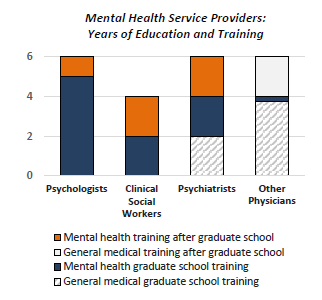About Psychology
Licensed psychologists are the nation’s leading providers of mental and behavioral health care services, and diagnose and treat mental and substance abuse disorders in a wide range of treatment facilities. There are more than 100,000 clinical psychologists in the U.S., licensed in all 50 states, the District of Columbia, Guam, Puerto Rico, and the U.S. Virgin Islands
Licensed psychologist-doctors complete a 4- to 6-year program to earn a psychology doctoral degree (Ph.D., Psy.D., or Ed.D.), including coursework and training in:
- biological, cognitive, and social bases of behavior
- assessment and diagnosis
- personality and intellectual assessment
- psychotherapy
- psychopathology and dysfunction
- data analysis and research methodology
- clinical consultation and supervision
In Vermont, individuals who complete a 2- to 3-year course to earn a master’s degree in psychology may be licensed as psychologist-masters. The coursework required to become a psychologist-master is similar to that required for psychologist-doctors, as are the licensing exams and supervision requirements.
Before licensure, psychologists (in Vermont, both psychologist-doctors and psychologist-masters) complete 2 years of supervised direct clinical experience, including an internship. The depth and breadth of this education and training is unique among behavioral health professionals.

Psychologists work with all kinds of patients in a wide range of settings, by . . .
- Providing psychotherapy to patients with post-traumatic stress disorder in offices, clinics, and via telehealth;
- Supervising patient treatment as the director of a partial hospitalization program or outpatient rehabilitation facility;
- Conducting neuropsychological evaluations and behavioral assessments of patients with dementia or Alzheimer’s disease within a skilled nursing facility;
- Seeing patients with different types of psychopathology as part of a group practice;
- Researching causes of and interventions to treat patients with serious mental illnesses, such as schizophrenia, to improve functioning within the community and inpatient settings;
- Coordinating the integration of behavioral health services with general medical services within a general hospital or primary care clinic.
Psychotherapy, the most common service provided by psychologists, is usually the preferred form of treatment for individuals with mental disorders. In most cases, psychotherapy is as–or more–effective than treatment with drugs. Psychotherapy also does not cuase unfortunate and unwanted side effects (such as agitation, weight gain, drowsiness, nausea, restlessness, and more) that usually occur with use of psychotropic drugs.
Although roughly 44 million Americans are diagnosed with a mental illness each year, less than half get mental health treatment. Of those getting outpatients mental health care, most are treated only with drugs, yet only 23% of prescriptions for psychotropic drugs are written by a psychiatrist.
- Mental disorders are the single leading cuase of disability in the U.S. Major depressive disorder alone costs us more than $52 billion a year in lost productivity and suicide-related costs.
- Mental disorders worsen general medical conditions and increase treatment costs. For patients with a chronic condition like diabetes or heart failure, depression doubles the rate of hospitalization and emergency medical services use.
Source: American Psychological Association Practice Services


